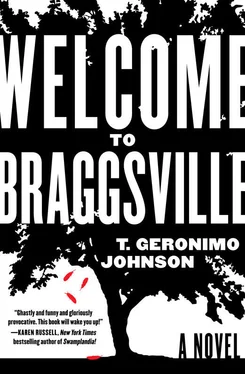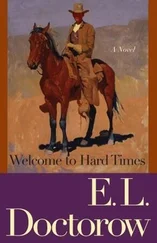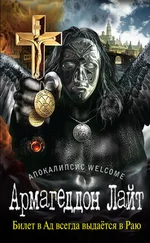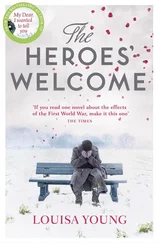From the moment he awoke, Daron knew it was going to be a day when two felt like four. He’d tried to ignore Charlie sniffling as he punched his clothes into his suitcase, but he couldn’t ignore his mother calling Candice to the phone. He had been afraid of how his parents might behave once his friends left. His father’s front seat speech after returning from County Morgue and Sheriff’s made it very clear there was more to be discussed. But as Charlie zipped his bag, Daron knew that more than anything else he would miss the company. He’d never had friends stay with him. Relatives, yes, but never friends. The first few hours of the trip had been like finally having the family he wanted.
Candice and Daron saw Charlie off. Daron’s parents stood in the doorway. As Hirschfield steered his oversize rental away, swaying on the shocks, Charlie waved, the attorney nodded. As if Charlie’s departure wasn’t enough, Candice said her parents would be there within hours, and that it would be better if Daron didn’t go outside when they arrived because, My father… doesn’t understand.
After passing the house three times, the Chelseas parked at the end of the drive. Mr. Chelsea popped the trunk and waited behind the car, stretching his calves, bouncing on the sloped curb. He was a large man, bigger than Daron had imagined, with heavy shoulders and arms, like he worked out more than most professors. He also stood differently, legs apart, arms crossed, as if in challenge. When Candice appeared at the door, which opened with a squeak, Mrs. Chelsea put her hands to her face in horror, and there they remained as Candice limped across the yard, her suitcase bumping along behind her. The wind stirred up her strappy yellow sundress and it looked like she would have been blown away without the boxy fracture boot to anchor her. Halfway across the yard, she dropped to one knee to adjust the Velcro strap on her bootie, hooking one elbow around her crutch for balance. Daron was reminded of an afternoon in Ohlone Park when he snuck up behind her to scare her, sticking a wet finger in her ear. She’d hugged him with relief as she now did her father — who was freed from whatever spell transfixed him and rushed to help her with the luggage. Next to him, she looked like a child.
The last thing she had done before exiting the house was kiss Daron’s cheek and thank him for sticking up for her. If only she had stayed for a couple more days, Daron knew he could have helped her understand it all.
STARTING THE DAY HIS FRIENDS LEFT, a vigil gathered every evening at the giant poplar, lighting candles in Louis’s name. Daron didn’t see anyone he recognized. He didn’t recognize the local Christian Fellowship Council leader, or the local Asian American Justice leader, or the NAACP local chapter president, nor had he known these organizations had local chapters, nor did he recognize the more assertive and outspoken protesters, the ones who carried picket signs with slogans such as BRAGGSVILLE, THE CITY HATE BUILT and BRAGGSVILLE, THE CITY FOR JUST-US. He also didn’t see the Changs, whom he’d stayed home to avoid, choosing to monitor the vigil on TV, even though his father said he couldn’t escape the inevitable.
Braggsville had never been a town divided, but the news sure made it sound that way. They claimed that it was 99 percent white, and that the Mexicans and blacks who worked at the mill were denied promotions and refused the opportunity to buy newer housing in town. They claimed that Bragg built the Gully, and founded Bragg’s Technical High over there across the Holler, just so the blacks wouldn’t have to go to the white school. They claimed that the Gully wasn’t part of incorporated Braggsville because they didn’t want to provide any services. They claimed that according to the census, Braggsville hadn’t had a registered black resident since the death of the midwife Nanny Tag, the Bragg family wetnurse, back in 1895. Daron knew that none of it was true, and whatever was fact was merely meaningless coincidence, but that didn’t stop him from getting hot, especially seeing as how everyone blamed him, even Quint. As Quint said, You can’t explain it away, D. You fucked the town up good. It was a jackass move. Your boy got done up like a nigger and hung hisself from a damned tree. What kind of shit is that? It’s a shame. He was a funny fella, and your friend and all, but this is bad for all of us. They were at the Gorge, a twelve-pack of PBR on the console between them, and Daron found himself crying in front of Quint, which he hadn’t done since fifth grade when Quint had tickled him until he peed himself. Like the deacon did that time in Nana’s church, Quint grabbed his biceps and squeezed tight, once, then twice.
THEN, ALMOST THREE DAYS AFTER THE INCIDENT, the FBI arrived. If Hirschfield was a ninja, agent Philip Denver was a samurai, conservative in manner and armored always in a dark-blue windbreaker with the letters FBI on the back, regardless of the weather. He was a towering man with large hands and seventies sideburns, his eye in the peephole like he was trying to look inside the house. The visit was brief, and the agent returned repeatedly to one question, and that was one question Daron couldn’t answer. And, unlike Hirschfield, Denver wanted to talk to Daron, and only Daron.
They were in the gazebo. Daron where he had sat the night after Louis’s death, when Charlie shared a story that Daron still didn’t quite believe. Denver sat across from him, where Candice had been, the same empty wine box on the table between them. When not repeating his favorite question, the agent lamented the media’s treatment of Braggsville or shared personal information, as he did now.
I’m from Florida. Got out, went to school in New York, realized how redneck my home was, and never went back. He spoke with a measured tone, as if the silences between the words were more important than the words themselves. I had friends there growing up, but a few of them did some wicked stuff sometimes. One day I had to decide, was I them or was I me? It was hard, is real hard to leave what you know. Malcolm X did it, though, so anyone can, right? Right?
Right, Daron nodded, though he thought it an odd example because Malcolm X stood with his people, not against them.
You know why I wanted to talk to you alone?
Daron shrugged.
First off, is it Da ron or Da ron ?
D’aron, with an apostrophe before the A.
Oh, why’s that?
D’aron shrugged again.
Denver leaned back in his chair. You never asked?
Scots-Irish. Lot of that around here.
Denver slapped at a mosquito and leaned in closer, into the waning light, shielding his eyes with his hands as he did so. The back of his hand was hashed with scars. I’d like for us to get along, D’aron. I may be the only law enforcement officer on your side. Understand?
D’aron shrugged. Over Denver’s shoulder, he could see that his father had returned to the kitchen window.
Look, D’aron. I’ll ask again. Have you seen any militia activity in the area? Any military training, in or out of uniform? Men with guns who aren’t hunting? Any unusual congregation in the woods?
D’aron laughed.
What?
My grandmother’s church used to meet out there. That was one unusual congregation. He left it at that. There was no point in mentioning the snakes and anchors and all.
Denver stood and looked toward the hill. So, there’s a church back in there?
It burned down long ago. I only went once, maybe was five or seven or something.
But no militia?
No, sir.
And you don’t know this guy with the cross tattoo, either?
No, sir.
He noisily whipped through the pages of his notebook. Miss Chelsea mentioned this man a few times. Are you sure that doesn’t ring a bell? He pinched the wedge of skin between his thumb and forefinger. A cross tattooed right here.
Читать дальше
Конец ознакомительного отрывка
Купить книгу












